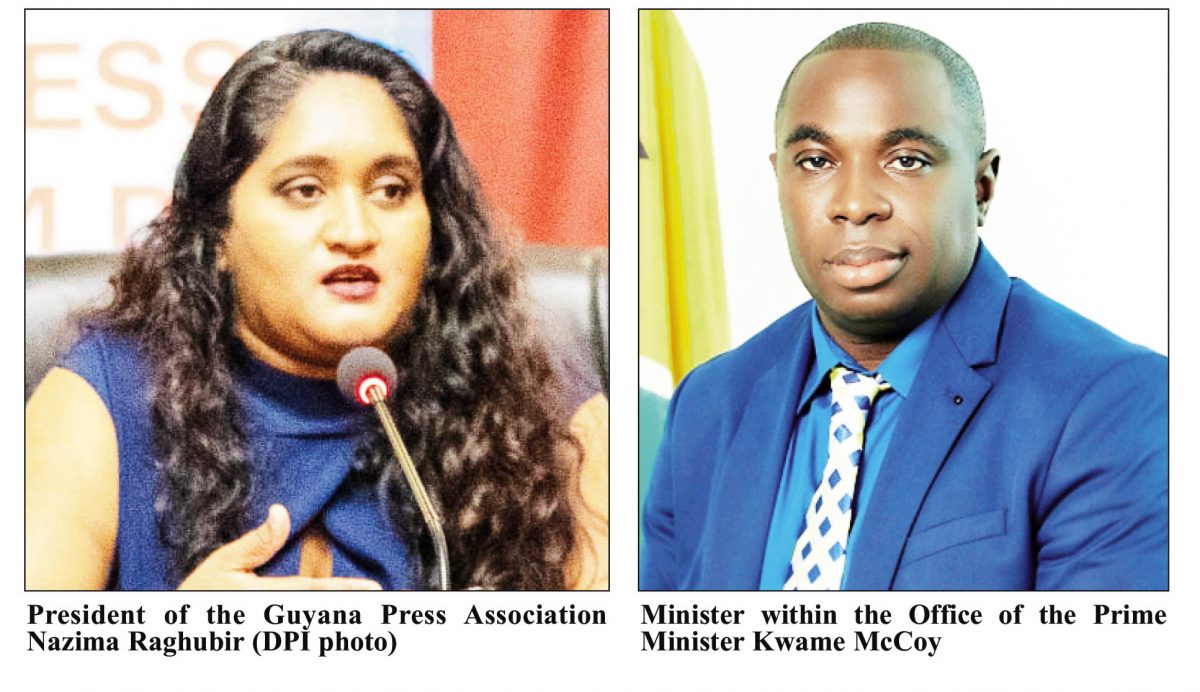The local press corps along with a number of news entities from Brazil were denied the opportunity to question Guyanese President Irfaan Ali and his Brazilian counterpart Jair Bolsonaro on Friday when the latter made his first official visit to Guyana.
Bolsonaro was in Guyana on Friday where he and a team met with President Ali and his government. His visit was in response to an invitation from the Guyanese President to further discussion on areas of cooperation between the two countries. The two leaders along with Surinamese President Chandrikapersad Santokhi met in Suriname in January this year where they discussed the establishment of an energy corridor.
Bolsonaro was expected to visit Guyana after that meeting but his mother died resulting in the trip being postposed.
On Friday, both countries’ Ministers of Foreign Affairs inked two agreements that would see enhanced collaboration on the legal front in the area of criminal and civil matters.
When the press corps arrived at the Arthur Chung Conference Centre on Friday, they were ushered into a conference room where they were made to stay as the Presidents arrived at the venue. The Department of Public Information (DPI) was the only entity allowed to film the arrival of the Presidents and it was only after The News Room’s Editor-in-Chief Fareeza Haniff strongly protested that her cameraman was able to film the Presidents’ arrival.
While in the holding room, accredited media workers from both Guyana and Brazil received radio silence from the Guyanese government’s media managers. This prompted reporters to raise concerns in a WhatsApp group managed by the DPI. It was only then that the press was informed that they would not be allowed to ask the Presidents any question nor have access to them on the sidelines of the event.
This information was not communicated to the media in the advisory sent out by President Ali’s head of communications Suelle Findlay-Williams.
The standard protocol for state visits usually involves a joint press conference.
In a comment to Stabroek News, yesterday, President of the Guyana Press Association (GPA) Nazima Raghubir said that it is not the first time that there has been a state visit or a major visit or event where the media has been treated as an afterthought in the planning process.
“This [lockout] comes as we observe World Press Freedom Week. We highlighted, as GPA, how important access [to information] is to good governance and also provide information to the public. This would have been a good opportunity, the interaction, the access to put additional information out there, gather additional information and question both heads of state on not only on the agreements signed but also the relationship and also the sort of economic advancements these partnerships and agreements hold for both countries. Clearly there is no type of interest in engaging the media at that level to provide that type of information,” Raghubir said.
She added that the situation makes it seem as though the media is being seen as just a conduit for information that the governments want to pass on without any meaningful engagement.
“It is obviously a trend and it is a trend that I don’t think the GPA alone has to speak out [on]. Media houses ought to be speaking out about this and about the lack of access for not only this type of event but similar engagements,” she further stated.
The GPA President reminded that the government would have been aware of the Brazilian President’s intention to visit and been informed ahead of schedule. In that regard she said that better arrangements should have been put in place for the accredited press corps.
Additionally, Raghubir said that the state media could have been used to disseminate the information in a timely manner had the government been concerned about crowds.
“Outside of that, better arrangements could have been made for the entire press corps who was accredited and I think the precedent has been set for this type of engagement since the swearing in of the President [Ali] when one [private] media house was allowed, and not even the state media [were] there, to set up for the president’s swearing in and then to carry it live, boycotting the rest of the media.
“I now see media houses complaining about access when they are clearly being left out [but] the media need to get together and decide whether they need to tackle these issues together or just in silos or when issues affect them,” the GPA President related.
Nothing sinister
The government, just last week, held the inaugural World Press Freedom symposium aimed at enhancing collaboration with the media. President Ali spoke about access to information and his government’s availability to scrutiny and offer clarification but Friday’s locking out of the press proves otherwise.
Minister with the responsibility for government communications, Kwame McCoy told Stabroek News while he was responsible for implementing the plans, it was the Ministry of Foreign Affairs that developed the actual plan and itinerary for the visit. Multiple calls to Foreign Affairs Minister Hugh Todd were unsuccessful.
McCoy said that one of the major factors that was taken into consideration during the visit was the time constraints of Bolsonaro.
“The [Brazilian] President had a short time window. We were told that he was on domestic travel and saw a window of opportunity and hopped over to keep his promise [of visiting]. There were three levels of the programme that had to be cancelled because of time. So there was nothing sinister at play,” he added.
The minister related that he informed the government media managers to apprise the local media of the plans as well as the fact that time did not permit any engagements with the heads of state. However, that was not done and it still remains unclear whether President Ali had time constraints that also prevented him from answering questions from the press.






